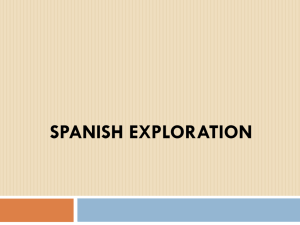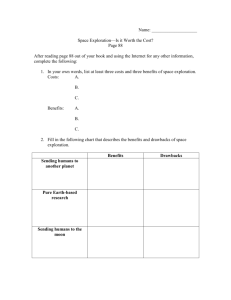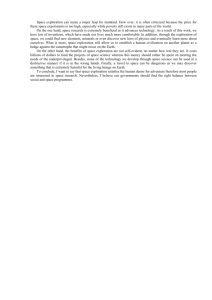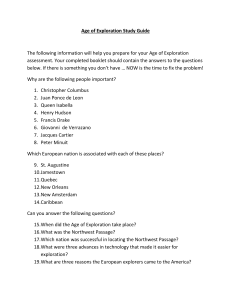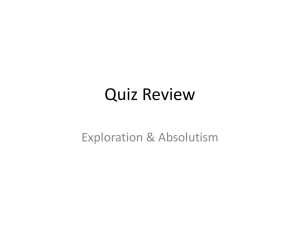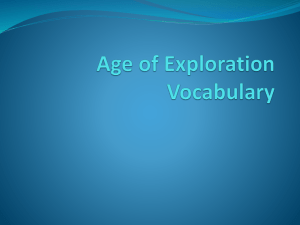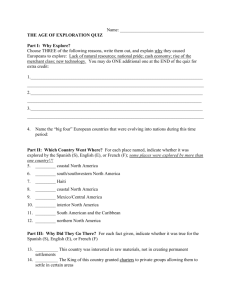Life Science
advertisement
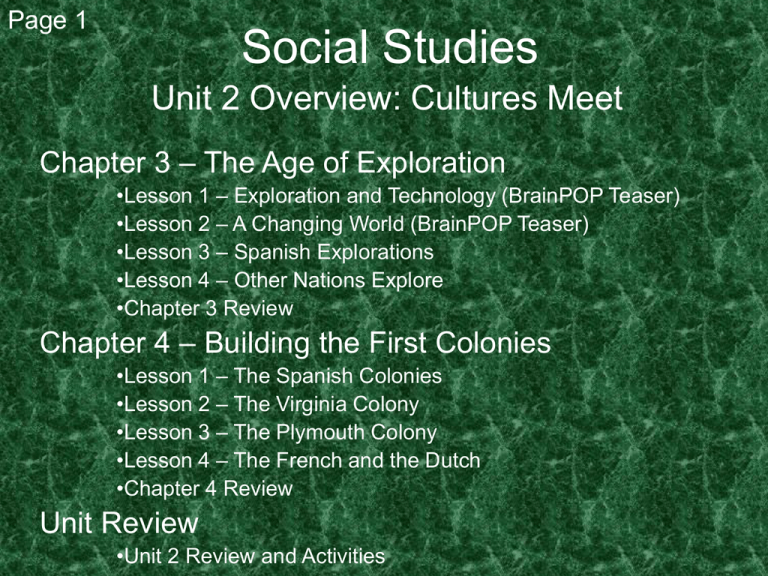
Page 1 Social Studies Unit 2 Overview: Cultures Meet Chapter 3 – The Age of Exploration •Lesson 1 – Exploration and Technology (BrainPOP Teaser) •Lesson 2 – A Changing World (BrainPOP Teaser) •Lesson 3 – Spanish Explorations •Lesson 4 – Other Nations Explore •Chapter 3 Review Chapter 4 – Building the First Colonies •Lesson 1 – The Spanish Colonies •Lesson 2 – The Virginia Colony •Lesson 3 – The Plymouth Colony •Lesson 4 – The French and the Dutch •Chapter 4 Review Unit Review •Unit 2 Review and Activities Page 2 The Age of Exploration Overview: 1) What do we already know? 2) Vocabulary 3) Drawings 4) Main Ideas 5) Review Page 4 The Age of Exploration: Vocabulary Part I 1) technology: scientific knowledge and tools 2) navigation: the science of planning and following a route 3) expedition: trips taken with the goal to explore new routes and lands 4) empire: a collection of land ruled by the nation that conquered them. 5) entrepreneur: business men who invested money and resources for potential gains. Page 5 The Age of Exploration: Vocabulary Part II 6) cost: the amount of money needed to explore. 7) benefit: reward gained 8) Reconquista: Spain was at war to push out all Muslims from the country by converting or removing them. The Age of Exploration: Vocabulary Part I Page 6 9) isthmus: A strip of land that connects to large land areas 10) treaty: an agreement between countries 11) grant: large sums of money given to explorers 12) conquistador: Spanish explorers/soldiers that conquered Native American tribes and claimed land through force Page 7 The Age of Exploration: Vocabulary Part I 13) reform: changes made in a group or organization (church) 14) Reformation: was a period of change in the Catholic Church which created the Protestant religion. 15) Counter-reformation: changes that the Catholic Church made to try to remain in power. 16) missionary: religious teachers sent by a church to convert people. The Age of Exploration: Vocabulary Part I Page 8 17) fact: a statement that can be proved 18) opinion: a statement that tells how a person feels 19) Northwest passage: a sailing route that would travel through the northern part of North America via rivers. 20) mutiny: is when sailors rebel against their captain. Page 9 The Age of Exploration: Drawings Page 10 The Age of Exploration: Drawings Page 11 The Age of Exploration: Drawings The Age of Exploration: Main Ideas Page 12 1) Exploration and Technology (pg. 110-119) • What was the importance of the technological improvements of navigational tools? a) allowed explorers to venture further away from known land marks and shipping routes. b) It made it possible for expeditions to return back home. c) Compass, Chronometer, Sextant, Astrolabe • What to know: Why did monarchs, explorers & entrepreneurs want to explore new sea routes and lands? a) find a new sailing route to Asia. b) Explorers and monarchs both benefitted from new found wealth. c) To claim new land Page 13 The Age of Exploration: 2) A Changing World (pg. 120-125) Main Ideas • Why did Europeans explore the Americas, and what did they find? a) They found land that they claimed for their monarchs. b) They discovered the Pacific Ocean. c) They found Native Americans d) For the possibility of finding riches and a new route to Asia. • Explorers a) Giovanni Caboto (England): AKA: John Cabot: explored Canada and the Eastern coast. b) Amerigo Vespucci (French): He explored South America near Brazil and was the first to believe that there was a land mass between Europe & Asia. c) Ferdinand Magellan (Spain): He sailed down the coast of South America, was the first to sail in the Pacific and was the first expedition to circumnavigate the world. Page 14 The Age of Exploration: Main Ideas 3) Spanish Explorations (pg. 128-134) • Why did the Spanish explore and conquer large areas of the Americas? a) to spread the Catholic Religion c) to claim more land to increase power b) to find gold and wealth • • d) find a western route to Asia Spanish Explorers (Conquistadors) a) Juan Ponce de Leon (Spain): First European to explore the U.S. b) Hernando Cortez (Spain): He defeated the Aztecs and started modern day Mexico City Events a) Counter Reformation: The Age of Exploration: Main Ideas Page 15 4) Other Nations Explore (pg. 138-143) • Why did Europeans explore North America, and what did they find? a) b) c) • People a) Giovanni de Verannciolo (French): b) Jacques Cartier (French): Page 16 The Age of Exploration: Review 1) Summarize the main ideas: 2) Practice Book: 3) Review
